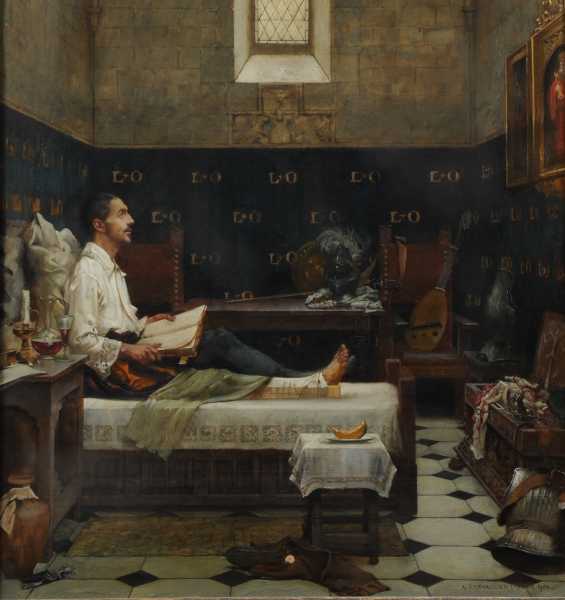“He had resolved to lay aside his garments and to don the armour of Christ” (A Pilgrim’s Testament: The Memoirs of Ignatius of Loyola)
Ignatius Loyola followed a long line of saints when he configured his Society as a regiment of the Church Militant.
St. Ignatius of Antioch leaves no doubt in his writings that he is aware that history is the arena of spiritual warfare: “It is certain from the days when God manifested Himself in human form in order to bring about the newness of life, that the ancient kingdom of the prince of this world was to be destroyed” (Letter to the Ephesians 19, 3).
It has also been a leit-motif of the great founders of orders in the Church. For St. Basil, the man who consecrates his life to God is dedicating his existence to be a combatant for Christ’s Kingdom in the face of all the enemies of that Kingdom:
“Excellent are a king’s laws for his ordinary subjects, but more kingly and noble are his military orders to his soldiers. As if he were hearing commands of a military nature proclaimed, therefore, let him who longs for heavenly and truly sublime dignities, him who desires to be with Christ eternally, let him be ready to follow when he hears the mighty words: “If any man minister to me, let him follow me; for where I am, there also shall my minister be.”
“Where is Christ our King? In Heaven. Thither, therefore, O soldier of Christ, you must hasten your march. A true soldier does not settle down in a fixed abode, does not cling to land and earthly possessions, does not suffer himself to become entangled in money or business affairs. ‘No man, being a soldier to God, entangleth himself with secular business; that he may please him to whom he hath engaged himself’ (2 Tim. 2:4).
“He must be prepared to pitch his tent anywehre and partake of poor meals. Countless are his marches and night vigils, his endurance of heat and cold, wounds from encounters with the enemy, the worst and greatest of danger, and perhaps in the end death itself – but a death that is glorious, honorable, and kingly in reward. During war his life is full of toil and trouble; during peace, full of glory. He is called the friend of the king; he stands at his right hand; he may shake hands with his king.
“Well then, Christian soldier, learn to know the value of eternal goods from such trivial earthly examples. Follow your heavenly King, frustrate the assaults of your invisible foes, fight bravely against the princes and powers of darkness, banish them first from your own soul and then from the souls who have chosen you as their guide and defender.
“In all these things you will have to undergo sufferings for Christ’s sake, but precisely because of these sufferings you will bear off the palm of victory. For you follow Him who will be victorious in the end and who desires to make you a partaker in His victory.” (St. Basil the Great, “An Introduction to the Ascetical Life” quoted in Hugo Rahner, The Spirituality of St. Ignatius Loyola [Chicago: Loyola University Press, 1980], pp. 71-72).
St. Benedict, whose Rule was carefully studied by St. Ignatius, called on the monk to consider his existence as the answer to the call “Domino Christo vero regi militaturus” [ to be willing to combat for the Lord Christ, the true king].
When the Basque soldier was convalescing from his war wounds, he came into contact with this vision of history through reading an introduction to St. Augustine’s City of God in The Golden Legend where St. Augustine unfolded the ultimate significance of historical events as unceasing conflict between two loves and two cities. The introduction stated „that his book was concerned with the story of two cities, with the kings of these two cities, Jerusalem and Babylon. For Christ is king over Jerusalem, Satan over Babylon. Two contrary loves gave birth to thse cities. The city of Satan was built on self-love, mounting up even to contempt of God; the city of Christ wa built on love of God, mounting up even to the contempt of self.” (The Golden Legend, quoted in Hugo Rahner, The Spirituality of St. Ignatius Loyola, p. 28).
These readings gave intellectual depth to truths he had breathed since childhood in the Church’s liturgy and catechism: the basic law for saving one’s soul is the law of combat: the doorway of the Crucifix is the only doorway to eternal salvation; struggle with evil, vigilance against one’s passions, the corrupt world and the Prince of darkness is an absolute, asceticism is the route to the mystical.
Later, his mystical experiences at Manresa would further deepen Inigo’s convictions which he would condense in the Spiritual Exercises. Two of the “exercises” (meditations) on the Kingdom of Christ and the Two Flags became the driving force for his decision to found the Society with a militant ethos. Ignatius portrays Christ as “the supreme Commander-in-Chief of the forces of good” calling the Christian to follow Him to battle in the war against the Prince of Darkness.
This requires firstly becoming like the Crucified Christ and then freely dedicating one’s life to fight in the defense and expansion of His Kingdom, the Church. All will occur in the face of the onslaughts of Satan and his conscious or unconscious allies. Love of Christ is the motive for enlisting in His army, love for others through seeking their salvation is the mission, and the union with Divine Love for all eternity the ultimate destiny.

